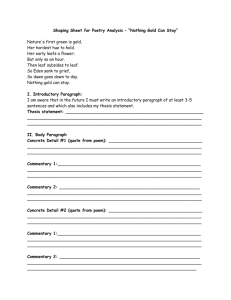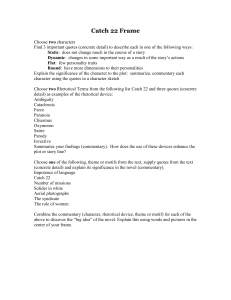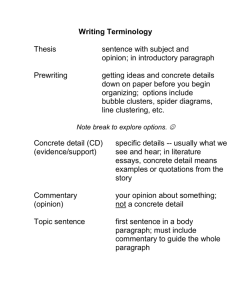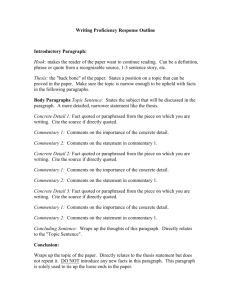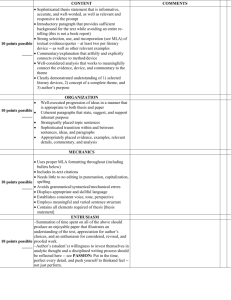Literary Analysis Practice
advertisement
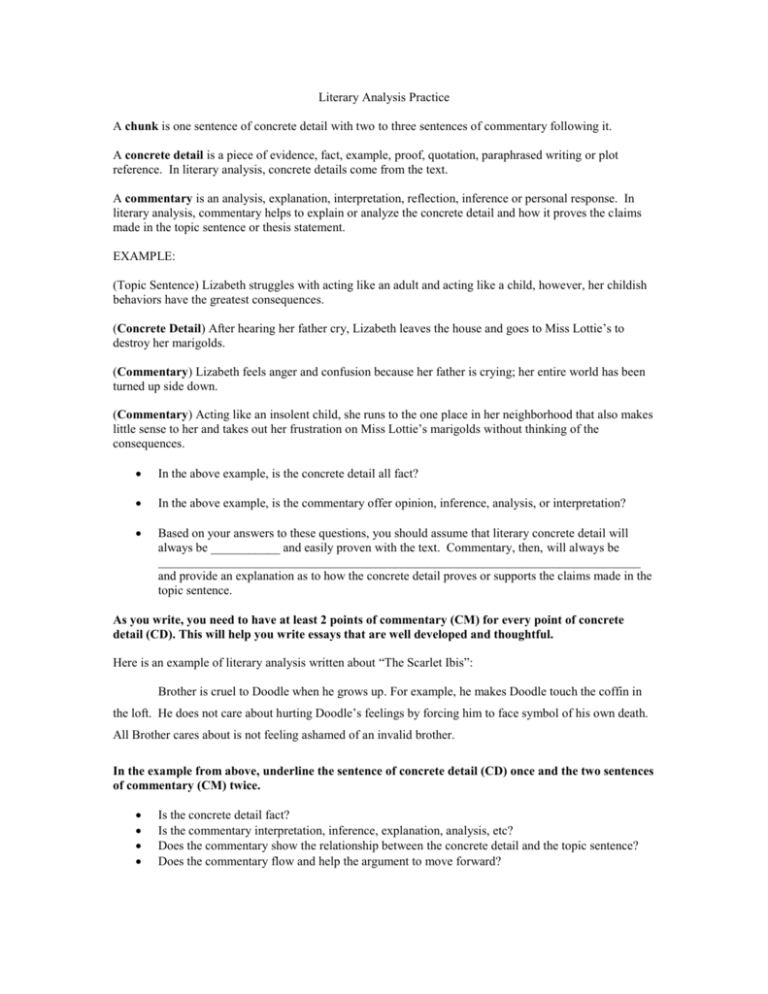
Literary Analysis Practice A chunk is one sentence of concrete detail with two to three sentences of commentary following it. A concrete detail is a piece of evidence, fact, example, proof, quotation, paraphrased writing or plot reference. In literary analysis, concrete details come from the text. A commentary is an analysis, explanation, interpretation, reflection, inference or personal response. In literary analysis, commentary helps to explain or analyze the concrete detail and how it proves the claims made in the topic sentence or thesis statement. EXAMPLE: (Topic Sentence) Lizabeth struggles with acting like an adult and acting like a child, however, her childish behaviors have the greatest consequences. (Concrete Detail) After hearing her father cry, Lizabeth leaves the house and goes to Miss Lottie’s to destroy her marigolds. (Commentary) Lizabeth feels anger and confusion because her father is crying; her entire world has been turned up side down. (Commentary) Acting like an insolent child, she runs to the one place in her neighborhood that also makes little sense to her and takes out her frustration on Miss Lottie’s marigolds without thinking of the consequences. In the above example, is the concrete detail all fact? In the above example, is the commentary offer opinion, inference, analysis, or interpretation? Based on your answers to these questions, you should assume that literary concrete detail will always be ___________ and easily proven with the text. Commentary, then, will always be _____________________________________________________________________________ and provide an explanation as to how the concrete detail proves or supports the claims made in the topic sentence. As you write, you need to have at least 2 points of commentary (CM) for every point of concrete detail (CD). This will help you write essays that are well developed and thoughtful. Here is an example of literary analysis written about “The Scarlet Ibis”: Brother is cruel to Doodle when he grows up. For example, he makes Doodle touch the coffin in the loft. He does not care about hurting Doodle’s feelings by forcing him to face symbol of his own death. All Brother cares about is not feeling ashamed of an invalid brother. In the example from above, underline the sentence of concrete detail (CD) once and the two sentences of commentary (CM) twice. Is the concrete detail fact? Is the commentary interpretation, inference, explanation, analysis, etc? Does the commentary show the relationship between the concrete detail and the topic sentence? Does the commentary flow and help the argument to move forward? To Review: One sentence of __________ ___________ with two to three sentences of _________________ creates a __________________. ____________ _____________ is evidence, proof, fact, plot reference, quotations, or paraphrasing. In a literary analysis, concrete detail is found in the ______________. ____________ is analysis, explanation, reflection, interpretation, opinion, inference, or personal response. In a literary analysis, commentary helps to __________ how the concrete detail proves the claims made in the _________ ___________ or ____________. Here are two student examples on “A Pair of Silk Stockings.” Read them, underline the CD once and the CM twice. In the lines provided, write your opinion about the example. A. John’s sample In “A Pair of Silk Stockings,” Mrs. Sommers feels a great sense of obligation and duty. For example, thoughts of her children cross her mind. She cares deeply for them. She feels good that she can help. Your opinion about John’s sample: ________________________________________________________________________ ________________________________________________________________________ ________________________________________________________________________ ________________________________________________________________________ ________________________________________________________________________ B. Ellen’s sample In “A Pair of Silk Stockings,” Mrs. Sommers feels a great sense of obligation and duty. For example, she thinks of the children’s need for hoses, clothes, caps, and hats. She cares deeply for her children’s welfare. Her first thoughts are unselfish, and she feels relieved that she can care for her children better. Your opinion about Ellen’s sample: ________________________________________________________________________ ________________________________________________________________________ ________________________________________________________________________ ________________________________________________________________________ ________________________________________________________________________ Common mistakes in literary commentary: Commentary is too generic. Commentary drifts from the topic sentence. Commentary is really concrete detail. Commentary repeats. Commentary contradicts the topic sentence.
